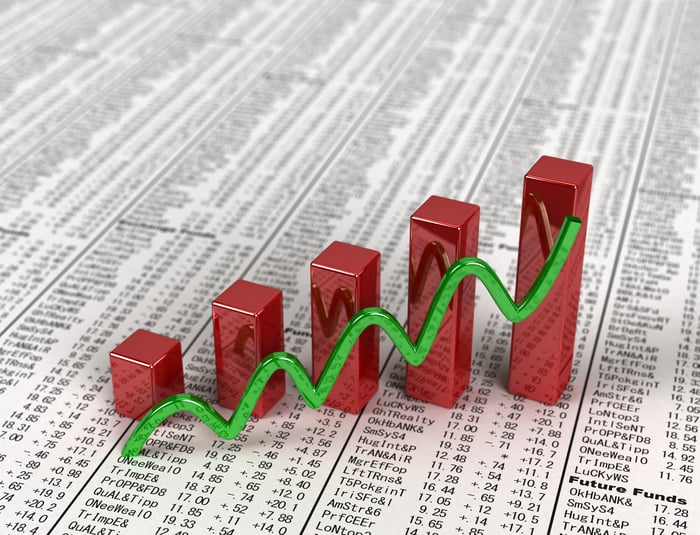Over the course of six decades, Berkshire Hathaway (BRK.A -0.03%) (BRK.B -0.10%) CEO Warren Buffett has put on a clinic for Wall Street and everyday investors. Whereas the broad-based S&P 500 is nearing a total return, including dividends paid, of 34,000% since the affably named "Oracle of Omaha" became CEO in the mid-1960s, Buffett has overseen a jaw-dropping aggregate gain of nearly 5,000,000% for his company's Class A shares (BRK.A)!
Even though Buffett is just as fallible as any investor, he and his top investment aides, which until his recent passing included the "Architect of Berkshire Hathaway," Charlie Munger, have demonstrated a knack for finding bargains hiding in plain sight. Decades of sustained outperformance of the S&P 500 is why professional and everyday investors wait on the edge of their proverbial seats to find out what stocks Buffett and his team have been buying and selling.

Berkshire Hathaway CEO Warren Buffett. Image source: The Motley Fool.
Though Buffett has been a recent net-seller of equities, a few stocks have caught his eye
Although Buffett has repeatedly opined that he'd "never bet against America," he and his team have been net-sellers of equities for five consecutive quarters. All told, nearly $39 billion more in equities have been sold than purchased between Sept. 1, 2022 and Dec. 31, 2023.
In spite of being a net-seller of equities, a couple of stocks have caught the Oracle of Omaha's attention recently. In particular, Berkshire's brightest investment minds have gravitated to two energy stocks: Chevron (CVX 0.27%) and Occidental Petroleum (OXY 0.55%).
Since the curtain opened in 2022, Buffett and his team have purchased more than 248 million shares of Occidental Petroleum. Meanwhile, Form 13F filings with the Securities and Exchange Commission show that Berkshire's top investors added approximately 15.85 million shares of Chevron in the December-ended quarter. Collectively, these two oil and gas stocks account for $37.2 billion of Berkshire's $368 billion investment portfolio.
The reason Buffett and his crew have placed so much conviction and capital behind these two energy stocks is simple: they believe the spot price of crude oil will remain above historic norms, or potentially head even higher. With most major energy companies forced to reduce their capital expenditures during the COVID-19 pandemic, the global supply of crude oil is now somewhat constrained. Typically, when the supply of an in-demand commodity is tight, the price of that commodity heads higher.
The lure of Chevron, which is the slightly bigger position by about $3 billion in market value, is that it's an integrated operator. In addition to drilling for oil and natural gas, it operates pipelines, chemical plants, and refineries, which provide either predictable operating cash flow in any economic climate or a hedge against a lower spot price for crude.
Occidental Petroleum is an integrated oil and gas company, too, but is comparably reliant on its higher-margin drilling operations for most of its revenue. A higher oil price will disproportionately benefit Occidental.

Image source: Getty Images.
The Oracle of Omaha has put $74 billion to work into one beloved stock in less than six years
With Buffett building up a $17 billion stake in Occidental in a little over two years, you'd likely assume that it, Chevron, or perhaps tech stock Apple, which comprises nearly 42% of invested assets, are the Oracle of Omaha's favorite stocks to buy -- but you'd be wrong.
Although you won't find it listed in Berkshire Hathaway's 13Fs, Buffett has spent north of $74 billion purchasing shares of one beloved stock since the midpoint of 2018.
To put this into perspective, the benchmark S&P 500 is comprised of 500 companies. As of the closing bell on April 10, 378 of these companies had a market cap of less than $74 billion. Warren Buffett and his top investment aides could have, in theory, purchased any of these 378 time-tested businesses with the cash that's instead been allotted to one special stock in less than six years.
What makes Warren Buffett's relentless buying of this beloved stock such an eye-opener is that it's shares of his own company that he's purchasing!
Prior to July 2018, Berkshire Hathaway's share repurchase program required that shares of the company trade at or below 120% of book value before they could be bought back. At no point in the years leading up to this date did Berkshire's stock dip to or below this threshold, which meant Buffett was unable to pull the trigger on a single cent worth of buybacks.
However, things changed in a big way on July 17, 2018. Berkshire Hathaway's board adjusted the covenants governing the company's share repurchase program to allow Buffett and Munger to work their magic. The board laid out two criteria:
- As long as Berkshire Hathaway has at least $30 billion in cash, cash equivalents, and U.S. Treasuries on its balance sheet; and
- Warren Buffett and Charlie Munger believe shares of their company are intrinsically cheap, buybacks can commence without an end date or a ceiling on spending.
Buffett has bought back shares of Berkshire Hathaway stock for 22 consecutive quarters since the board amended these criteria.
Since Berkshire Hathaway doesn't pay a dividend, share repurchases are the easiest way for the company to reward its long-term-minded investors. Buying back stock is steadily reducing its outstanding share count, which is incrementally increasing the ownership stakes of the company's investors.
Additionally, companies with steady or growing net income tend to enjoy a healthy lift to their earnings per share (EPS) because of buybacks. With almost $168 billion in cash, cash equivalents, and U.S. Treasuries on Berkshire's balance sheet, as of December 31, you can rest assured that the Oracle of Omaha will continue deploying his company's capital into his favorite stock, Berkshire Hathaway.





